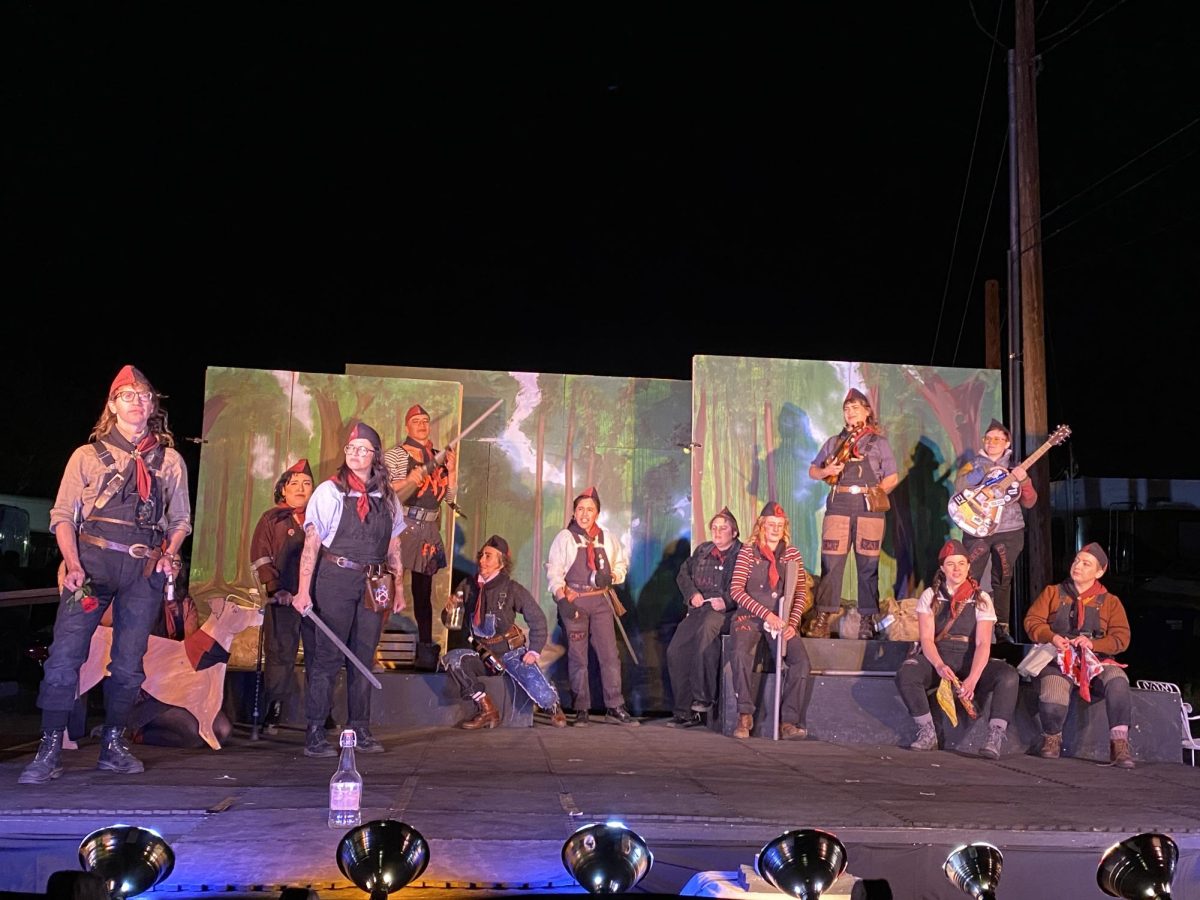
The leftist rebels prepare for battle during the last show of “Enríka La Quarta” on Saturday, April 6, Courtesy Shakesqueer Theater
No animals were harmed in the Shakesqueer Theater production of “Enríka La Quarta.”
The cast of last Saturday night’s performance made that very clear when they promised the audience, “whatever you fear, don’t fear for the dog.”
The dog in question? A cut out prop – and character in its own right – who joins the revolutionaries of the Spanish Civil War in their fight against fascist control.
“Enríka La Quarta” is a retelling of Shakespeare’s “Henry the IV Part I,” reimagined by Gabb Schivone and the creative team of Shakesqueer Theater.
“Many of the monologues and the themes are taken from it,” said actor Riana Johnson, who plays the questionable revolutionary, Falstaff. “It also kind of perfectly aligns with what was going on during the Spanish Civil War.”
The production centers around Enríka, a leader of the Confederación Nacional del Trabajo, Azul, the golden child of the revolution, and their comrades.
The story transported the audience on April 6 from their seats under the Tucson stars into the heart of 1930s Barcelona.The Popular Front, comprised of the main leftist parties, has just won a popular election and the fascist allies of Franco’s government and the Axis powers are trying to push out the anarchists and other leftists within Spain, creating a dangerous power struggle.
The story follows Enríka and Azul as Enríka tries to rally the rebellion against the fascist military, and Azul struggles to prove himself to the movement and to Enríka.
Threats of betrayal lurk within their allies as tensions rise, and eventually hostility escalates to all out war between members of The Popular Front and the fascist military.
Although in the end, the Spanish Civil War was not won by the leftist revolutionaries, Johnson said that the main message is one of resilience and hope.
“It’s important to bring forward the idea that another world is absolutely possible, that a group of radicals can figure out how to come together to make a better thing while they last,” Johnson said. “We don’t portray their losing, because we want it to be hopeful.”
That message of hope and resistance seemed to resonate with the audience.
“A lot of the plot and the elements felt more topical to what’s going on politically in the United States,” said Rae Goodnight, a returning Shakesqueer Theater fan.
While the background and themes of the play deal with darker topics like the existential fight against fascism, brutality, and the struggle for the soul of a nation, the production still manages to be delightfully comedic and witty.
The audience was encouraged to cheer on the rebellion, disparage the fascists and to laugh as loudly as they pleased. With over 100 seats filled for Saturday’s final performance, it became much more than an intimate theater production.
Johnson’s own character, the lovable, rambunctious drunk, Falstaff, provided much of the comic relief, and was easily a crowd favorite. Johnson had the audience in stitches, as Falstaff told grandiose tales of valor, wrapping himself in bandages for sympathy, or taking credit for victory in battle.
“I really love that you could tell the actors were having such a great time,” said Trinity Higgs, a first time attendee of Shakesqueer Theater. “Their energy on stage really made the play come to life.”
Olivia Klein, who was attending the show with Higgs, said that it was the music that stood out.
This was the first musical Shakesqueer Theater has produced, and the musical numbers included quintessential protest songs “Dirty Overalls” by Woody Guthrie and “Love Me, I’m a Liberal” by Phil Ochs, as well as songs that would have been sung during the time of the Spanish Civil War, which added to the message and feel of the production.
Shakesqueer Theater, since its founding in 2017, has done just one production a year. You can follow them on Instagram @shakesqueertheater, to keep up to date with future performances.
Arizona Sonoran News is a news service of the University of Arizona School of Journalism.